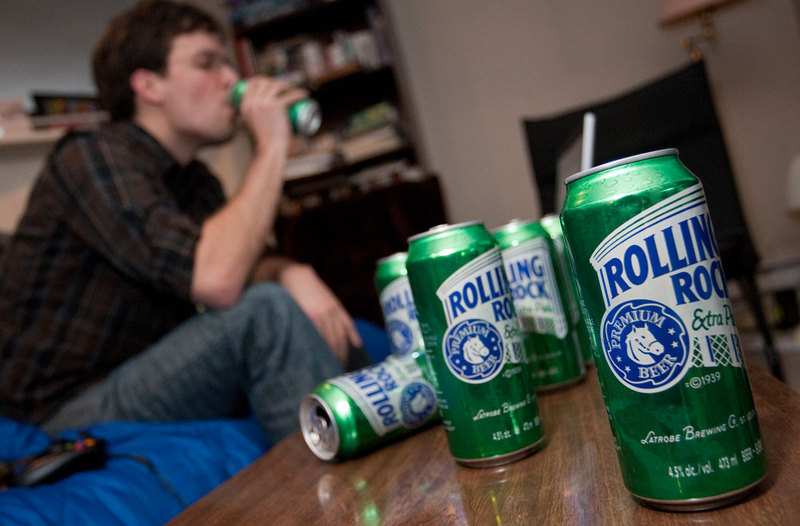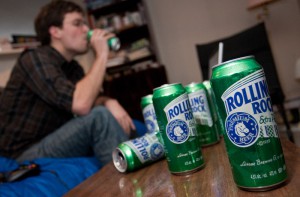Breaking the binge: the impacts of some students’ favourite activity pastime


Having a few drinks every once in a while is fun. Ending up in the hospital because of reckless drinking is not.
With St. Patrick’s Day dawning upon us, we are all anticipating a weekend full of day drinking and games. However, it’s important to understand what excessive drinking can do to the body and mind of the drinker.
“Alcohol is a drug and it is toxic to our human bodies and there’s a limit to what you can take,” Marilyn Nieboer, the health educator at Wilfrid Laurier University, said. “If you take too much too quickly, the consequences can actually be fatal because alcohol can kill you.”
According to Statistics Canada, heavy drinking was reported among 24.3 per cent of males and 10.7 per cent of females in 2012 aged 12 or older. This was a significant decrease for males from 26.8 per cent in 2011. However, for females, there was no change from the 2011 survey conducted by Statistics Canada.
It is not bad to go out and have a few drinks, just as long as an individual is aware of all of the risks that they need to avoid. There are those who purposely skip meals before drinking in order to get drunker quicker. This phenomenon, dubbed “Drunkorexia,” causes the body’s tolerance level to decrease and you will quickly lose control.
“The blood alcohol concentration can spike quickly so fast that you don’t recognize it and by the time you’re on your second or third drink you don’t realize how drunk you are because it happened,” Nieboer said. “You should be eating and drinking lots of fluids in between drinks because you’ll suffer from the side effects.”
Knowing when to stop drinking to ensure your safety as well as the safety of others is essential before you begin your drinking endeavors.
Elyse Horrigan, the BACCHUS coordinator at Wilfrid Laurier University, has worked to promote safe drinking for students on campus and helped educate students about the signs when someone should go to the hospital as a result of excessive binge drinking as a worst-case scenario.
“It’s always better to be safe than sorry, so trust your instincts,” Horrigan said. “If the person is unresponsive or mumbling, vomiting, has slow or irregular breathing or their eyes are rolling back into their head, then professional help is needed.”
Alcohol poisoning can lead to fatal results if not treated immediately. This can lead to the drinker becoming comatose or even leading to death.
“Your breathing is slowing down so eight breaths or less in a minute is a sign that the alcohol poisoning has gone into your central nervous system and it will slow down,” Nieboer said. “That means that there is no oxygen getting to the brain and that is when coma can happen and it becomes fatal.”
Horrigan also explained that it is important for those surrounding the drinker to be prepared to help. She advised that the peers keep the drinker awake and talking and putting them in the First Aid Recovery position, which involves the unconscious being rolled onto their side so they can clear out their airways and avoid choking on vomit.
“Never leave [the unconscious person] alone in their room to fall asleep,” Horrigan warned. “Stay with them and monitor their symptoms and call 911 if necessary.”
This can easily be prevented as long as the drinker eats during the day so that they have a strong stomach. Drinking lots of water before, after and during your consumption of alcohol. The trick is to pace yourself once you are finished your first alcoholic drink.
“Keep track of how much you’re drinking and remember that it takes about 30-60 minutes for the effects of alcohol to hit you,” Horrigan said. “Be cautious of this and don’t have five drinks because you aren’t feeling the affects yet.”
The morning after drinking may almost be worse than the events of the night before. Common signs of a hangover include the individual being less productive and increasingly sluggish, as well as having a headache and episodes of vomiting. In addition, being hungover can prevent you from being productive for the duration of the day.
“Most students don’t think about it on a Saturday night but if they have an assignment or a midterm the Monday morning and they decide Sunday is study day so they go out Saturday night,” Nieboer explained. “And then the next day, they don’t want to study or do that paper. You just feel really lousy.”
Unfortunately for the drinkers, there are very few remedies present to cure hangovers completely.
“I wish I could tell you that there was some miracle remedy, but unfortunately the only true remedy is time and rest,” Horrigan said. “Drinking water can also help with the dehydration caused by drinking too much alcohol.”
Both Horrigan and Nieboer encourage students to be smart and safe the next time they drink. They also said to be cognizant of the number of drinks you are having and know what your limit is and do not exceed that and also to be alert to the surroundings and know what to do if you see someone with alcohol poisoning.
“Most people drink to have fun, why would you put yourself at risk and not feel well?” Nieboer concluded.


